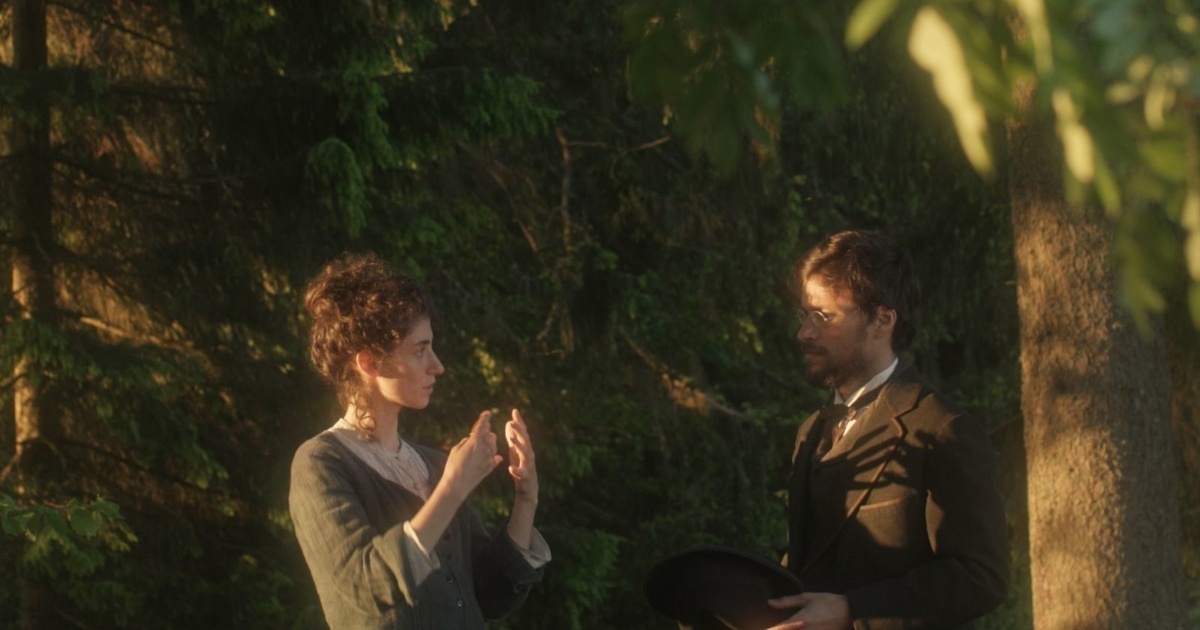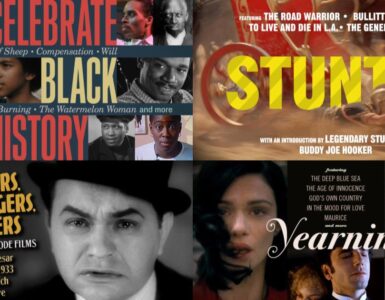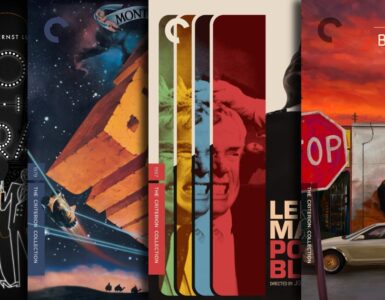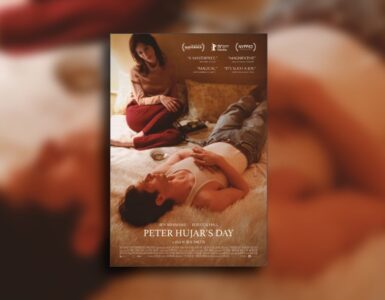
With 2023 now here, it’s time to reflect on what was another banner year for the art of the motion picture. As people return more and more to movie theaters some long-awaited films saw release this year, even overdue pictures like James Cameron’s breathtaking Avatar: The Way Of Water (my number 11 on this list, for anyone who cares) and cinemas worldwide were inundated with blockbuster after blockbuster. However, what were the real best of the best? Did Steven Spielberg follow up his brilliant West Side Story with another knockout? Which of the 14 Hong Sang-soo films released in 2022 will be featured on this list? Enough preamble, here are the ten best films of 2022 as voted on by no one by myself.
10. Earth II
Starting off this year’s list is one of the bigger surprises of 2022. Coming out of numerous film festivals, including the increasingly essential Prismatic Ground, Earth II comes from the minds of a collective known as the Anti-Banality Union. The film is a fascinating, 97-minute film-cum-collage, a collection of clips from various films ranging from The Matrix to The Martian, that are chopped together to tell the story of the end of the world. In many ways the science-fiction take on a documentary like Los Angeles Plays Itself, Earth II strips away the snarky commentary, simply letting each clip paint a portrait of a civilization on the brink of collapse.
With the 1% hell-bent on getting themselves off the planet they helped light on fire, Earth II is a brilliantly paced post-post-modern thriller that recontextualizes everything from the status of the Hollywood blockbuster to the type of fascists we celebrate in these films (the particular placement of Will Smith as a Blue Lives Matter AmeriNazi is provocative to say the least). Truly cannot remember the last time a film this searingly political was also this inherently exciting. A real masterpiece.
9. Unrest
Next up is arguably one of the year’s prettiest films. Directed by Cyril Schaublin, Unrest introduces viewers to Josephine, a cog in the large machine that is a Swiss watch factory in 1877. After becoming frustrated with the organization of labor and the focus on possession, she encounters famous Russian anarchist Piotr Kropotkin and begins to dive deeper and deeper into the movement, at a point where production itself is set to evolve after the introduction of things like photography and time studies.
Painterly and achingly romantic, Schaublin returns to features after 2017’s brilliant Those Who Are Fine and has turned this quiet meditation on labor, production and class into a painterly and achingly romantic character study. The cinematography here is rich and feels strangely delicate, like the watches we see being created. A profoundly political film, the film has the trappings of an ornately composed period drama but is a film of genuine rebellion and revolution. From the very outset, with these beautiful women in their beautiful dresses discussing, without holding any hands, the politics of the day, Schaublin’s film leans into the dense nature of its narrative. It’s a startling work of maturity and one of the year’s very best films.
8. Coma
Coming in at number eight is the latest from a CriterionCast favorite. Bertrand Bonello returns with Coma, the director’s lockdown picture. While that may, at first blush, sound insufferable (if it were any other director I would have skipped this myself), Bonello’s film is wholly unlike anything else in 2022. Reteaming Bonello with his Zombi Child star Louise Labeque, the film tells the story of a teen girl who appears to live entirely by herself during the COVID-19 pandemic, as her real and imagined lives and experiences begin to intertwine.
Completely unlike anything Bonello’s done before, Coma features everything from computer animation to surveillance footage, all blended together to tell the story of a mind unraveling from isolation. It also has something of a personal touch, with the film itself playing as a conversation between Bonello and his own teenage daughter. It’s inarguably one of the more original pandemic pictures and features a lead performance that really gives the film an emotional center to connect to. Bonello seems to take real joy in bringing to life the modern teen. From a maudlin melodrama between two dolls to a genuinely terrifying handheld exterior sequence, Bonello’s film carries with it the same raw, unfocused, and emotional energy that is found in one’s youth, let alone one spent inside a small box on someone’s Skype call. For a film as opulent as this, that emotional center is undoubtedly needed. Not every digression here works, but Bonello’s dreamlike deconstruction of one young woman’s pandemic experience is equal parts comic and existentially terrifying.
7. Cow
From one of cinema’s great storytellers comes one of the year’s great documentaries. Cow sees director Andrea Arnold taking on a new mode in the form of non-fiction cinema, but to the director’s credit, this experiential picture feels deeply rooted in her overall larger project. Simply put, Arnold’s film introduces viewers to Luma, a dairy cow located on a cattle farm in England. Profoundly intimate and empathetic, Cow takes us through Luma’s experiences on the farm over a four-year span, from birth to milking, and everything in between. At times unshakably beautiful and otherwise harrowingly grotesque, the film centers almost exclusively on Luma’s perspective, with the most actual language that’s heard coming from a kinetic soundtrack of diegetic musical cues from songs just playing in the background.
Arnold’s quietly claustrophobic camera works wonders here, embracing long takes to better envelope each viewer within Luma’s world, seemingly sparking a connection between camera and cattle that feels entirely otherworldly. Tableaus like that of Luma’s face set opposite a richly shot skyline make the more harrowing moments all the more potent and powerful. At just 94 minutes in length, this modest, provocative dive into the world of one dairy cow stands as yet another knockout from director Andrea Arnold. Quiet, thoughtful and empathetic, Cow is a film unlike any other seen yet this year. Subtle and experiential, this is one filmgoing experience that won’t soon be forgotten.
6. Queens Of The Qing Dynasty
Next up on the list is one of the many surprises out of this year’s incredible NYFF lineup. Arriving out of the Currents sidebar, Queens of the Qing Dynasty is directed by Ashley McKenzie and tells the story of an 18-year-old woman named Star (Sarah Walker), who befriends An (Ziyin Zheng) following a series of failed suicide attempts. The two spark quite a partnership, a friendship that sees the two grow increasingly closer thanks to their shared experiences as outsiders in their larger communities. However, this isn’t a simple buddy comedy.
No, instead, viewers are given something far more interesting, far more surreal. A remarkably esoteric work, Queens sees director McKenzie riffing on names like Bresson through her use of full frames, close-ups, and audacious sound design, to craft a film that’s wholly sensorial. The performances here are rich and layered, with Sarah Walker being particularly of note here,. Turning a character that could easily read as shrill or self-destructive Walker instead turns Star into a flesh and blood character, a young woman given a new lease on life thanks to a new partnership. Inarguably one of 2022’s most exciting and important films.
5. Home When You Return
Next up on this list, and clocking in right, dead center, is one of the great films from an increasingly exciting film festival. In just its second year, Prismatic Ground is already cementing itself as one of the great alt-festivals running today, and this breathtaking short is one of the myriad of reasons one. Entitled Home When You Return, the film is Carl Elsaesser’s 30-minute knockout that takes the melodramatic works of poet-turned-filmmaker Joan Thurber Baldwin and turns them into a mysterious, strangely surreal double exposure of a homage.
Opening with an introduction that sets the film up with a comically disquieting cloud that hangs over every subsequent second, Elsaesser’s film feels the closest we’ve gotten to making good on the phrase “Lynchian,” in his darkly comic reverence for mid century melodrama and his use of sound and photographic distortion. Instead of seeing the wild-haired auteur as a referential figure and more a reverential one, no moment here feels flat. A masterful meshing of visuals, sound and text, Home When You Return is a brilliant, darkly comic short that brings to tactile life the way memories stick themselves to the walls of the spaces we share them in.
4. The Unstable Object II
Now this is my type of sequel. From director Daniel Eisenberg comes the follow-up to his 2005 film, The Unstable Object, The Unstable Object II. Ostensibly a collection of processes, The Unstable Object II thrusts viewers into three different places, all of which produce some sort of product or commodity. First there’s a German prosthetics workshop, where viewers watch as a prosthetic limb is brought to life in something that resembles documentary cinema but feels strangely sci-fi. Next, viewers encounter a French workshop where custom gloves are made, with the final third of the film focusing on a jeans factory in Istanbul.
In each of these segments (vignettes is not the right word as the full film here is 204 minutes in length), director Eisenberg engages the viewer with similar questions, almost all of which are born not out of any direct line of questioning, but by a film where the duration is more or less the point. Well over three hours long, the film is an experiential work, using its duration to both embed the viewer within each of these worlds, and ask things ranging from workers rights and their experience to just what the market forces are that have made this item and these processes a requirement. We have moments of true, human transcendence like that of seeing a man begin jogging after getting fitted for a prosthetic leg, to the nightmarishly science-fiction experience of watching a mass production plant function. Each mode of production is examined with great depth and humanity, with the quiet, contemplative nature of its direction giving the film a decidedly anti-capitalist energy to the picture. Duration as political choice.
3. Skinamarink
In what was another solid year for genre cinema, the very best work is a near-generational piece of filmmaking. Entitled Skinamarink, the film comes from director Kyle Ball and tells the story of one seemingly endless night experienced by two children who awaken only to notice that all the windows and doors in their home have disappeared. What results is a nightmarish descent into the madness of the unknown, where they await the return of their parents only to be met by a voice that beckons from the void.
Carrying with it the same sense of terror as that feeling of walking up a flight of stairs in the dark of night, Skinamarink is a gorgeously impressionistic experiment in atmosphere, focusing its narrative less on the specifics of what is or isn’t happening and more the terror found within the unknown. Events increase in their disturbing nature, leading to some genuinely inspired jump scares that are elevated by a profound patience and understanding of how what’s just out of frame is exponentially more terrifying than anything that could be placed within it. Viewers watch as the two child protagonists navigate a seemingly evolving home, where the most mundane items like fans or lamps become objects of pure fright. It’s simply one of the most astonishing horror films since We’re All Going To The World’s Fair. An absolute masterpiece.
2. The Novelist’s Film
What would a year be without a handful of new films from beloved director Hong Sang-soo. Of the selection (including films like Walk Up as well as Introduction and In Front Of Your Face which were more widely seen this year) it’s his The Novelist’s Film that stands as the very best. Possibly Hong’s very best film yet, this work follows a female novelist who takes a trip to get back with a friend. As far from his drunken ruminations on male/female relationships, The Novelist’s Film tells the story of Jun-hee (Lee Hye-young), as she connects with an actress (Kim Min-hee) and attempts to sascitate her creative spirit.
Absolutely a film of self-reflection (Kwon Hae-hyo even returns as, you guessed it, a middle-aged filmmaker of some renown), the film is also absolutely about Hong’s own relationship with Kim Min-hee, culminating with inarguably Hong’s greatest final scene. There’s a stylistic shift in this last scene that turns the film into something startlingly rapturous, deconstructing the very film we’ve just spent 90-ish minutes watching. It’s not a rug-pull, no. Instead, Hong gives us this film about the beauty of spontaneity, and makes that theme literal in his gushing love letter to his partner. If truth is beauty, and beauty truth, then few films this year are more evocative, more genuine.
1. The Fabelmans
Rounding out this year’s best-of list is the latest entry on the list, but also the only one whose position is indisputable. The latest from legendary auteur Steven Spielberg, The Fabelmans is Spielberg’s profoundly personal coming-of-age film that stars Gabriel LaBelle as Sammy Fabelman, the thinly veiled Spielberg proxy, as he falls in love with filmmaking. Opposite LaBelle are Michelle Williams and Paul Dano who play his mother and father respectively, as well as names like Judd Hirsch and even David Lynch who, and I won’t spoil this, but sends the film off on a hell of a high note.
Spielberg’s never one to shy away from making personal films in the least personal of modes. Films like A.I. are always tinged with profoundly human ideas and moments that transcend the often blockbuster stylings his films take on. However, this is Spielberg in an entirely new and exciting mode. The performances here are utterly breathtaking, particularly Williams and Dano who are at the very height of their powers here. Williams is of particular note for turning in a performance that’s startlingly textured as the matriarch of the family. That said, the film would fail if it weren’t for LaBelle’s performance, which has much more agency and nuance to it than one would imagine. Spielberg’s camera is also unreal here, seemingly loving each and every moment of being able to capture that feeling of making your first movie with a bunch of friends, particularly when he gets to show off some of young Sammy’s tricks. There are moments here, like seeing him use a wooden board to resemble dirt flying up during a war picture that both give energy to the film, and remind you that even as a kid, Spielberg had it. Just a breathtaking, deeply felt character study that only someone as skilled as Spielberg could create. Maybe the greatest film from the greatest filmmaker of the last half-century. Once in a lifetime film.





